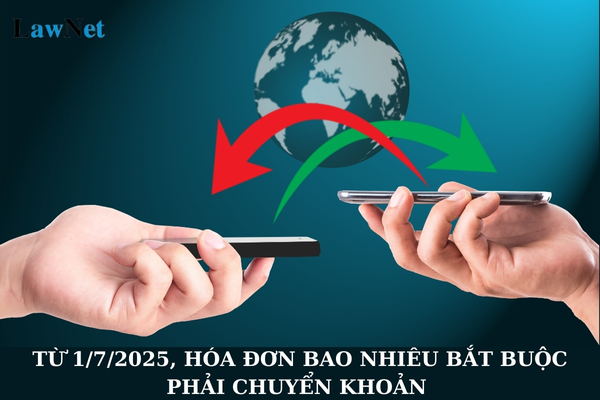From July 1, 2025, what invoice amount is required to be transferred via bank to qualify for input VAT deduction in Vietnam?
From July 1, 2025, what invoice amount is required to be transferred via bank in order to be eligible for input VAT deduction in Vietnam?
Based on point b, clause 2, Article 14 of the Law on Value-Added Tax 2024 (effective from July 1, 2025), the conditions for deducting input value-added tax are stipulated as follows:
Deduction of input value-added tax
...
- Conditions for deducting input value-added tax are stipulated as follows:
a) There must be a value-added tax invoice for the purchase of goods or services, or proof of payment of value-added tax at the import stage, or proof of payment of value-added tax on behalf of foreign parties as specified in clauses 3 and 4 Article 4 of this Law. The Minister of Finance stipulates the proof of payment of value-added tax on behalf of foreign parties;
b) There must be evidence of non-cash payment for purchased goods and services, except for certain specific cases as prescribed by the Government of Vietnam;
c) For exported goods and services, in addition to the conditions specified in points a and b of this clause, there must also be: a contract signed with a foreign party for the sale, processing of goods, provision of services; an invoice for the sale of goods, provision of services; evidence of non-cash payment; a customs declaration for exported goods; a packing list, bill of lading, insurance documents for goods (if any). the Government of Vietnam provides stipulations for deduction conditions for cases of goods export through foreign e-commerce platforms and other specific cases.
...
According to the provisions of the Law on Value-Added Tax 2024, all purchased goods and services must have evidence of non-cash payment, except for certain specific cases as prescribed by the Government of Vietnam.
This means that from July 1, 2024, all purchased goods and services, regardless of invoice value, must be transferred via bank (have evidence of non-cash payment) to qualify for input VAT deduction, except for certain specific cases as prescribed by the Government of Vietnam.

From July 1, 2025, what invoice amount is required to be transferred via bank to qualify for input VAT deduction in Vietnam? (Image from the Internet)
Which entities are VAT payers in Vietnam according to the Law on Value-Added Tax 2024?
Based on Article 4 of the Law on Value-Added Tax 2024 (effective from July 1, 2025), the entities liable to pay VAT are stipulated as follows:
- Organizations, households, individuals producing or trading goods and services subject to VAT (hereafter referred to as business establishments).
- Organizations, individuals importing goods subject to VAT (hereafter referred to as importers).
- Organizations, individuals conducting production or business in Vietnam purchasing services (including cases of purchasing services associated with goods) from foreign organizations not having a permanent establishment in Vietnam, individuals abroad who are considered non-residents in Vietnam, except as stipulated in clauses 4 and 5 Article 4 of Law on Value-Added Tax 2024; organizations conducting production or business in Vietnam purchasing goods and services to conduct search, exploration, and development activities related to oil and gas fields by foreign organizations not having a permanent establishment in Vietnam, individuals abroad who are considered non-residents in Vietnam.
- Foreign suppliers not having a permanent establishment in Vietnam conducting e-commerce business, digital platform-based business with organizations, individuals in Vietnam (hereinafter referred to as foreign suppliers); organizations managing foreign digital platforms carrying out deduction, payment obligations on behalf of foreign suppliers; business organizations in Vietnam applying the value-added tax calculation method which is the deduction method purchasing services from foreign suppliers not having a permanent establishment in Vietnam through e-commerce channels or digital platforms carrying out deductions, paying obligations on behalf of foreign suppliers.
- Organizations managing e-commerce platforms, managing digital platforms with payment functions carrying out deduction, tax payment on behalf of, declaring deducted tax for business households, individual businesses on e-commerce platforms, digital platforms.
Additionally, the Government of Vietnam specifies the details of clauses 1, 4 and 5 Article 4 of Law on Value-Added Tax 2024; stipulates taxpayers in cases where foreign suppliers provide services to purchasers who are business organizations in Vietnam applying the tax deduction method.
What are the 8 prohibited acts in tax deduction, tax refund in Vietnam from July 1, 2025?
According to Article 13 of the Law on Value-Added Tax 2024 (effective from July 1, 2025), the 8 acts prohibited in tax deduction, tax refund from July 1, 2025 include:
- Buying, giving away, selling, advertising, brokering the purchase, sale of invoices.
- Engaging in non-genuine transactions of buying, selling goods, providing services or transactions not conformable to the law.
- Issuing invoices for selling goods, providing services during business suspension, except for issuing invoices to customers for contracts signed before the suspension notice.
- Using illegal invoices, documents, or illegally using invoices, documents as stipulated by the Government of Vietnam.
- Failing to transfer electronic invoice data to tax authorities as stipulated.
- Tampering with, misusing, unauthorized access, destroying information systems related to invoices, documents.
- Offering, receiving, or brokering bribes or conducting other acts related to invoices, documents to qualify for VAT deduction, refund, seizing tax money, or evading VAT.
- Colluding, covering up; conspiring between tax management officials, tax authorities, business establishments, importers, or amongst business establishments, importers in the use of illegal invoices, documents to qualify for VAT deduction, refund, seizing tax money, or evading VAT.

